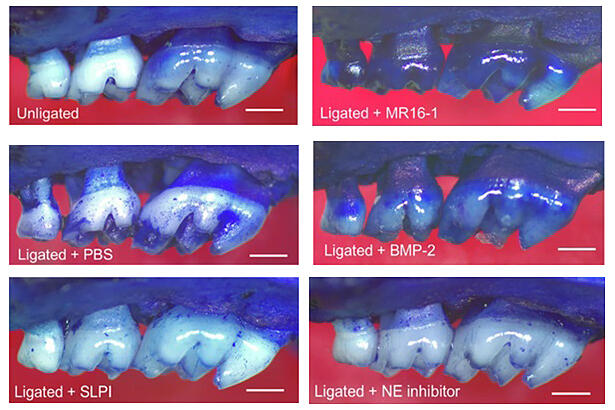A research group led by PhD-Dentist Karin Sasagawa, Associate Professor Hisanori Domon, and Professor Yutaka Terao from Niigata University Graduate School of Medical and Dental Sciences announced that they successfully discovered that the protein "SLPI" found in saliva decreases when periodontitis becomes severe, and that administering synthetic SLPI can suppress this progression. This was confirmed through experiments using mouse models of periodontitis. The results are expected to lead to the development of therapeutic drugs for periodontitis. The group's findings were published in the international academic journal Communications Biology on May 16.

Periodontal bone loss assessed using stereoscopic microscopy. Negative values indicate bone loss relative to the unligated group. Significant bone resorption was induced in the ligated + PBS group, whereas the administration of SLPI, the NE inhibitor, MR16-1, or BMP-2 significantly attenuated bone loss.
Provided by Niigata University
Periodontitis is a disease caused by bacterial infection, affecting one in two Japanese people, with higher incidence rates among the elderly. When it becomes severe, it destroys the alveolar bone, making it a leading cause of tooth loss. Recent reports also indicate that periodontitis can worsen various systemic diseases. There is a need to develop treatments based on scientific evidence.
Previously, in 2022, the research group had revealed that elastase (a protein-degrading enzyme) increases in periodontal tissues, and the breakdown of molecules that bind cells together leads to severe periodontitis. Elastase is an enzyme secreted by neutrophils, a type of white blood cell. While neutrophils break down periodontal bacteria by engulfing them, some periodontal bacteria damage neutrophils, causing elastase to leak out and worsen the disease.
In this study, the research group examined the possibility that SLPI, an enzyme-inhibiting protein produced by white blood cells that protects normal mucous membranes from enzymes, suppresses elastase degradation. They investigated SLPI gene transcription and protein expression in periodontal tissues of mouse models of periodontitis and found that in periodontitis, SLPI was reduced at both the gene and protein levels.
Next, they examined elastase activity and inflammatory cytokine gene transcription in periodontal tissues. As a result, they found that in periodontal tissues, elastase becomes activated as SLPI decreases, damaging its own tissues and inducing excessive inflammation. When synthetic SLPI created by the research group was injected into gums that had developed periodontitis and showed reduced SLPI, it was confirmed that both elastase activation and excessive inflammatory responses were suppressed. SLPI administration also suppressed bone destruction caused by periodontitis in the alveolar bone, and induced reactions that promote bone regeneration.
The group also looked at other therapeutic drug candidates. Since IL-6, which induces inflammation, increases in severe periodontitis, they administered an antibody that inhibits its receptor (MR16-1 provided by Chugai Pharmaceutical Co., Ltd.) and confirmed suppression of severity. A certain therapeutic effect was also confirmed with the administration of bone morphogenetic protein (BMP-2).
While SLPI does not have systemic effects like IL-6 receptor inhibitors and bone morphogenetic proteins, which are therapeutic drugs for other diseases, it was considered effective specifically for periodontitis. Since SLPI is a protein naturally present in the body, it is believed to have extremely low side effects, and there appears to be no reduction in effectiveness from repeated use. Synthetic SLPI can be synthesized even with laboratory-level experimental equipment, making it relatively easy to produce.
Terao commented: "This research is still at the stage of verifying the effects of SLPI and other treatments on periodontitis in mice. In the future, we want to examine the entire mouse body to investigate whether there are any side effects. Research beyond that point will be difficult for just one laboratory, so we are hoping for participation from pharmaceutical companies and others in collaborative research."
Journal Information
Publication: Communications Biology
Title: Secretory leucocyte protease inhibitor regulates bone metabolism and inflammation in experimental mouse periodontitis
DOI: 10.1038/s42003-025-08197-3
This article has been translated by JST with permission from The Science News Ltd. (https://sci-news.co.jp/). Unauthorized reproduction of the article and photographs is prohibited.




